DO-IT News November 2017

Volume 25, Issue 5
Below are the articles of the DO-IT News November 2017 newsletter. These articles can also be seen all on one page at the Full Newsletter option.
Director's Digressions: DO-IT Receives Economic Opportunity Award!
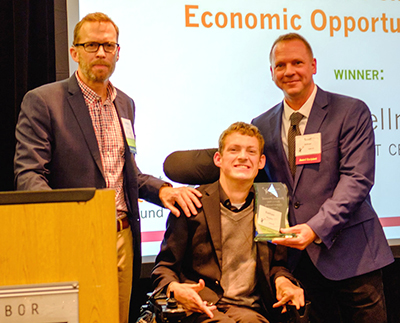
On November 2, The University of Washington’s Disabilities, Opportunities, Internetworking, and Technology (DO-IT) Center received the “Frances Pennell Economic Opportunity Award” from the Northwest Access Fund. Several awards were given at the Access Fund’s annual ceremony and community dinner, which took place at the Bell Harbor Conference Center in Seattle.
The economic opportunity award, named in honor of the NW Access Fund’s founding executive director, recognizes an individual, organization, or business that provides people with disabilities opportunities, programs, or resources for economic advancement.
Award winners are selected based on five categories: dedication, impact, barrier confrontation, originality, and inclusion. DO-IT was recognized for more than 25 years of work to help empower individuals with disabilities to be successful in college and careers, thereby helping to ensure their meaningful participation and full access to the U.S. economy. DO-IT’s electronic mentoring programs, educational support, and focus on access to empowering technology were highlighted during the award ceremony.
Scott Bellman, program manager of DO-IT, accepted the award and thanked me for my leadership over the last 25 years. Bellman shared, “People with disabilities have the skills and the talent to participate in the economy, but they need equal access. They need empowering technology, and they need to not be discriminated against for simply being human. After all, having a disability is a normal part of the human experience.”
Bellman, along with DO-IT program coordinator Tamitha Tidwell, highlighted one of DO-IT’s premiere programs, DO-IT Scholars, a comprehensive program for helping teenagers in Washington prepare for and succeed in college, graduate studies, and careers, using technology as an empowering tool.
The DO-IT Center also strives to promote the application of universal design to physical spaces, information technology, instruction, and services; freely distribute online content, publications, and videos for use in presentations, exhibits, and the classroom; and provide resources for students with disabilities, K-12 educators, postsecondary faculty and administrators, librarians, employers, parents, and mentors.
DO-IT Projects Featured in UW College of Engineering News Article
In their latest newsletter, the University of Washington’s (UW) College of Engineering highlighted the importance of making engineering and computing programs accessible to students with disabilities. The College of Engineering pointed to DO‑IT’s AccessEngineering program as a great “resource for universities nationwide” to promote accessibility and inclusion.
The article showcases 2013 Scholar and AccessComputing team member Hannah Werbel talking about her experience in those programs: “I don’t feel like I’m pursuing my education alone, or that I have to figure out how to overcome obstacles that others don’t have to by myself.”
AccessEngineering Co-PI Kat Steele shared how engineering should be accessible to even non-engineering students through Makerspaces. “Makerspaces are continuing to grow on university campuses, and we wanted to provide some best practices so that as these new spaces are being created they can be accessible to as many students as possible,” she said. “The more diversity we have in engineering the more problems we’ll be able to solve.”
Read the full article here.
AccessComputing Team Member Profile: Rahil
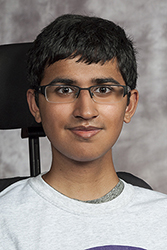
Hello, my name is Rahil and I am a student at the University of Washington (UW) Bothell studying computer science and software engineering. This summer, I began an internship at UW Bothell’s gaming studio, Digital Future Lab (DFL). This is an ongoing internship that started in June and will end in December. I am a developer on Hug the Line, a new PC game that is out now for early demo. I am primarily programming for the game along with other team members. In my work on the game I use the game engine Unity and program in C#.
Before this internship, I had applied to several large companies including T-Mobile, Expedia, and Starbucks. I needed a capstone internship for my major, and I went to watch presentations in March to see what other students had done for their capstones. I learned about the DFL from a presentation and got the position not long thereafter.
I have enjoyed the experience and found it to be very valuable. I like that the studio encourages teamwork, and my team works well together. The studio is also small, so it is easy to meet and interact with everyone. Additionally, this internship has helped me improve my skills as a software developer, and I am now familiar with what is expected in a professional setting.
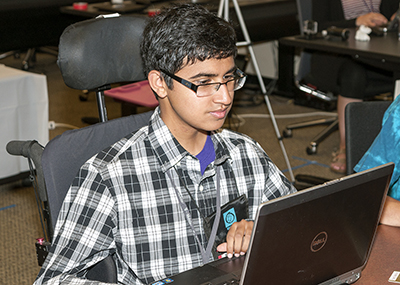
I have learned about what game development and developing high-quality software entails. In terms of subject knowledge, I have learned about event handling using delegates, writing unit and integration tests, using coroutines, ray casting, and using Unity or a similar game engine to create an industry-standard game. This internship has allowed me to gain more experience with C# and Unity, which I have worked with previously and wanted to learn more about. My career and professional knowledge has increased because I have learned to better communicate my work to people who are from other disciplines and majors. I now fully understand how important it is to network and make connections with co-workers as well as recruiters.
As a result of this internship, I am more motivated to continue learning about all aspects of computer science and software engineering. I have been to the Seattle Indies Expo, a convention for independent game developers and studios, and helped demonstrate Hug the Line at a gaming convention. I think other AccessComputing students should look as broadly as possible when searching for internship and job opportunities. A good opportunity can be found at a company or organization of any size.
New DO-IT Videos Featured Online
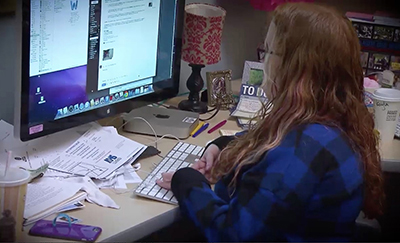
DO-IT has many new videos released recently. These videos span a wide variety of topics, from recruiting and retaining employees with disabilities to making your videos accessible.
One of our videos, Graduate School and Students with Disabilities, focuses on ways that students with disabilities can be successful in graduate school. This video features students with disabilities, educators with disabilities, disability service providers, and professors and how they recommend navigating the application and accommodation processes. Recommendations include planning extra time to request accommodations (especially for standardized tests), creating a support system, and finding what accommodations work best for you in graduate school.
All DO-IT videos can be viewed in the fully accessible AblePlayer, which allows for speeding up or slowing down a video, toggling on captions, watching a version with audio description, and reading along with the transcript. See all of our new videos and more on the DO-IT Videos page.
How to Plan Disability Awareness Events
At some point in your life, whether at school, work, church, or your community, you may have been exposed to the idea of an “awareness” event, day, week, or even month. Whatever the length of time, these events are meant to focus on a single issue within society. They may take several forms, such as inspirational speakers, fundraising, workshops, town halls, and simulations. This article is meant to help guide you through the process of planning a disability awareness event on a school campus or in your community.
What is awareness?
This is a question that’s important to unpack. Awareness should lead to long-lasting change within a community and ideally, it should facilitate action. Awareness should create or strengthen a commitment to social justice, addressing power and privilege. In this context, it is critical to identify the “problems” as barriers created by our society and culture, rather than placing blame on individuals or the existence of a disability within a person.
Should we have a disability simulation activity?
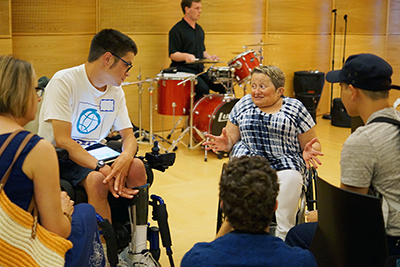
Disability simulations are a go-to activity for disability awareness events, however many people believe that simulations are a problematic approach. You may have seen a simulation that includes a wheelchair obstacle course or participants walking around with blindfolds to see what it is like to be a wheelchair user or blind, respectively. Simulations are used to show how difficult it must be to have a disability, which is not awareness that helps your community. They teach others that having a disability is something to pity and portrays the disabled community as helpless and disadvantaged. Of course there are challenges in having a disability, but these challenges are often the attitudes and barriers created by society, not the disability itself. Instead of having a wheelchair obstacle course, consider having teams explore and identify accessibility issues that need to be fixed. Look for ramp access, signage that is difficult to read, and other barriers. You can easily make this activity a competition. You could then have a follow-up activity—such as a petition, a town hall, or a future meeting—to promote creating recommendations to administrators to address these issues. This approach reinforces the idea that access problems lie within buildings, policies, and institutions- not within individuals.
What else should I do?
Disability awareness events, if done right, provide opportunities to make a significant impact in your community. The following steps can guide you in creating an effective disability awareness event.
1) Assemble an event planning team with various perspectives.
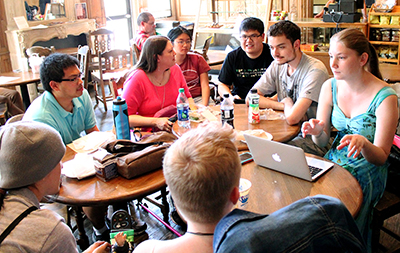
Brainstorm all of the possible individuals and organizations in your community that can help (e.g., non-profits, leaders, activists, students, clubs, and educators). Most importantly, involve people with disabilities in the planning and make sure a wide variety of disabilities are represented in the planning process. Also, strive to invite people with diverse characteristics, such as ethnicity, sexual orientation, culture, etc.
2) Decide on a format.
Use your planning team to ask people with disabilities what they’d like to see. Ideas may include a panel, round table, petition, movie viewing and a discussion about media, a speaker that talks about accessibility, a resource fair, and more. Prioritize the voice of people with disabilities and other marginalized communities. It is important to think critically about “inspirational speakers.” Comedian and activist Stella Young addresses the idea of inspirational speakers and talks about objectifying people with disabilities through “inspiration porn” in her TED talk called “I’m not your inspiration, thank you very much.”
And most importantly, establish the takeaway you want your audience to have. Always ask yourself if your event is perpetuating ableism (the systemic oppression of disabled persons) or dismantling it.
3) Decide if you need funding.
Consider what it will cost to fund the venue, captioning, interpreters, food, printed materials, and technology. To help mitigate these costs, seek volunteers and in-kind contributions. Then approach administrators and other sources for funding assistance.
4) Promote your event – and make it accessible!
Promote your event on campus, on social media, and in your networks through posters and flyers. If you have assembled a diverse planning team, they will be able to connect with their own networks and distribute the information.
Be prepared to provide various accommodations such as accessible documents, interpreters, and captions on videos. You can find a list of tips to help you plan an inclusive event here.
To share the event as widely as possible, create an email announcement to forward that includes a summary, date and time, location, RSVP instructions, and contact information. Again, include information about requesting accommodations, and be sure to make your announcement accessible. For more information about accessible documents, visit our website.
5) Evaluate.
Develop an evaluation to have attendees fill out after an event so you can see real data that tells you about the success of your event. Use this information to improve future events.
Tami Tidwell Nominated for Governor's Committee on Disability Issues and Employment's Direct Support Professional of the Year
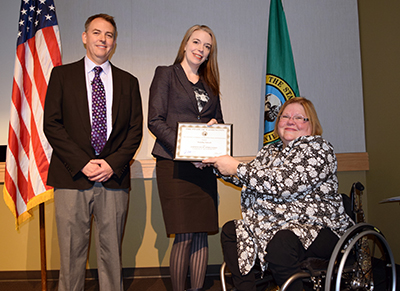
Sean Marihugh, Microsoft employee and 2009 Ambassador, and Michael Reese of Bellevue College nominated Tami Tidwell for the 2017 Governor’s Committee on Disability Issues and Employment’s (GCDE) Direct Support Professional on the Year.
Tami has worked for DO-IT for thirteen years. During that time, she has empowered hundreds of students with disabilities to achieve their goals. Tami truly cares about all the students she works with. She has been a lead staff of projects such as AccessSTEM, AccessSTEM CAREERS, and DO-IT Scholars, dedicating her time to help students learn the best methods for getting through competitive college programs and into challenging careers.
Tami was honored as a nominee during the award ceremony on October 31st. DO-IT is lucky to have a dedicated employee such as Tami working with students in our programs.
AccessComputing and AccessCSforAll Resources Called Out in New Report
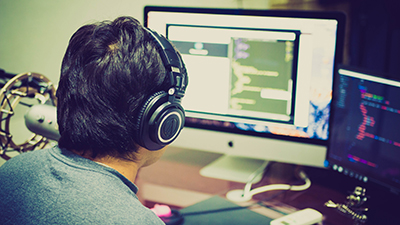
This past summer, the Benetech’s DIAGRAM Center released its innaugural DIAGRAM Report. This report looks at ways technology is changing the educational landscape for students with disabilities. This year’s report focused on accessible coding, machine learning, multimodal user interactions, multimedia interactives, personalized learning, and speech recognition.
Of particular interest to DO-IT’s role in AccessComputing and AccessCSforAll is the section on accessible coding, which discussed the importance of learning to code, challenges for students with disabilities, and a variety of resources. AccessComputing, AccessCSforAll, and the Quorum programming language were among the resources listed. To learn more about what’s going on to make coding accessible, read the report here.
The DIAGRAM Center is a Benetech initiative that aims to building new paths to accessibility by supporting different learning needs with emerging technologies and community engagement. Benetech develops software that helps people with disabilities read and learn.
The Thread: Disability and Employers
Below are excerpts from recent conversations in our online mentoring community related to disability disclosure and accommodations in the workplace. This gives you the flavor of the many rich conversations the DO-IT community has online. Forum posts are edited for clarity and brevity.
I’m interested in observations and experiences with disability accommodations in industry and academia. I’m aware that, legally, the obligation should be same, but I also know that lived experiences can diverge from what is supposed to happen.
AccessSTEM Team Member: In my experience, industry is a million times more accommodating. I think the problem is academic institutions are so large and so competitive, and to be successful you are essentially required to sacrifice your mental and physical health, even if you’re not disabled. To get accommodations requires massive amounts of paperwork, doctor’s notes, meetings, disclosures, and even then the accommodations you get may not be adequate. But, when I was hired at my current company as a chemist/polymer scientist, I told them about my disabilities (latex allergy, need to sit for many tasks), and they completely redid the lab to remove all latex gloves without even asking for a doctor’s note. There’s no judgment about needing to ask for time off or help doing a task.
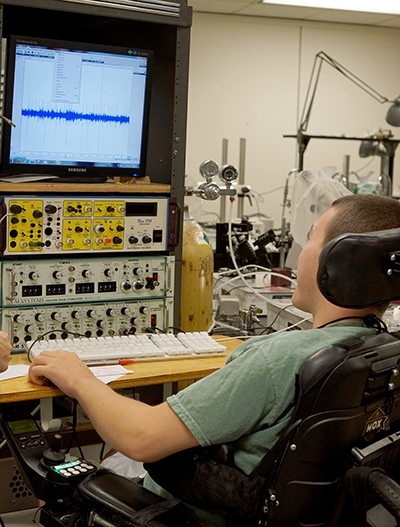
AccessComputing Team Member: It doesn't really matter if industry is better in general about accommodations. It only matters what the disability culture is like at the specific place you are considering working. If industry is generally better, but the place you are interviewing at isn't, then it doesn't matter. If academia is generally worse, but the place you are interviewing is really positive and progressive, then it doesn't matter what other institutions are like.
AccessComputing Team Member: Perhaps the question would be better phrased "In which sector would I be more likely to find an accommodating workplace culture?"
I am at a point in my education where I need to make some decisions that will affect my readiness for a career in either industry or academia. The question at the moment is whether I should put significant time/energy into learning how to teach, and, in the process, I would need to find or invent teaching methods that work for me and my disability.
AccessComputing Team Member: I have been a rehabilitation engineer for almost twenty-eight years now and have seen every situation you can imagine. The hardest part about making your decision is similar to what prospective students have to do now when they think about prospective higher ed programs. Finding out what the actual culture of the organization you intend to interact with is the most important thing. Unfortunately, finding a network that can vouch for the organization is another story. Cast your net as wide as possible among all the people that you know and have them help scout out every place you are interested in, whether it is private industry or academia.
DO-IT Mentor: Someone had commented that you should cast a wide net and explore many possibilities to find something that suits you. I agree with this strategy. However, in all likelihood, you need to limit yourself at some point to going the academic or the industrial route. Go with your passion on this decision, then cast a wide net.
DO-IT Mentor: Both inclusive/non inclusive workplaces may provide the same accommodations because they have to, but the inclusive workplace is going to be more supportive. You may find co workers and supervisors are more comfortable with “difference” at an inclusive workplace and the workplace bias’ that can ultimately discriminate against people with disabilities in subtle and overt ways will be less. So, ask about diversity and inclusion in your interviews. Do some research. What do you see or hear at a potential workplace?
DO-IT Mentor: Ask and examine prospective employers from the standpoint of inclusivity. If they demonstrate and talk about diversity, but not inclusion, then what that may tell you is that they are more about meeting the regulatory requirements as far as accommodating disabilities. They will do what they have to do. That is the letter of the law as far as disability accommodations.
About DO-IT
DO-IT (Disabilities, Opportunities, Internetworking, and Technology) serves to increase the successful participation of individuals with disabilities in challenging academic programs and careers, such as those in science, engineering, mathematics, and technology. Primary funding for DO-IT is provided by the National Science Foundation, the State of Washington, and the U.S. Department of Education.
For further information, to be placed on the DO-IT mailing list, request this newsletter or other materials in an alternate format, or make comments or suggestions about DO-IT publications or web pages, contact us at
DO-IT
University of Washington
Box 354842
Seattle, WA 98195-4842
doit@uw.edu
www.uw.edu/doit/
206-685-DOIT (3648) (voice/TTY)
888-972-DOIT (3648) (toll free voice/TTY)
509-328-9331 (voice/TTY) Spokane
206-221-4171 (fax)
Founder and Director: Sheryl Burgstahler, Ph.D.
And stay updated on DO-IT activities by joining us on Facebook and Twitter!